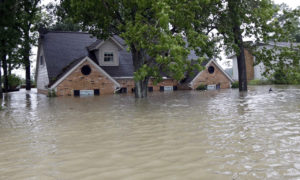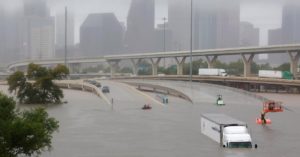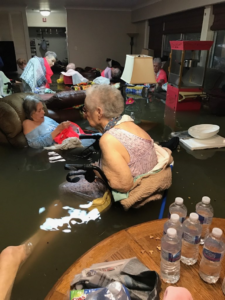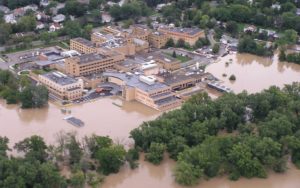The National Hurricane Center reports…

 that: “Harvey was Texas’ deadliest hurricane in 98 years. All 68 of the deaths were in Texas; 36 in Houston’s Harris County. None was from storm surge — sudden coastal inundation from the sea — which is usually the deadliest part of a hurricane, [lead author Eric S.] Blake said. All but three of the deaths were from freshwater [inland vice coastal] flooding.
that: “Harvey was Texas’ deadliest hurricane in 98 years. All 68 of the deaths were in Texas; 36 in Houston’s Harris County. None was from storm surge — sudden coastal inundation from the sea — which is usually the deadliest part of a hurricane, [lead author Eric S.] Blake said. All but three of the deaths were from freshwater [inland vice coastal] flooding.
“The hurricane center estimates Harvey’s damage at $90 billion to $160 billion with a midpoint of $125 billion, placing it second in U.S. history behind Katrina’s inflation-adjusted $161 billion. The maximum winds of the Category 5 storm on landfall were 133 mph.”
 Harvey also spawned 57 tornadoes, according to the report.
Harvey also spawned 57 tornadoes, according to the report.
One of the chief culprits, as you may know, is the loss of wetlands in the Houston area. And, of course, Houston has long been championed, or vilified, for its lack of zoning laws.
 From the environmentalist website Quartz: “Wetland loss is one of the many effects of lax rules. The construction of flood-prone buildings in flood plains is another one: The elderly residents of La Vita Bella, a nursing home in Dickinson, east of Houston, were up to their waists in water before they got rescued. The home is within the Federal Emergency Management Agency’s (FEMA) designated flood zone.”
From the environmentalist website Quartz: “Wetland loss is one of the many effects of lax rules. The construction of flood-prone buildings in flood plains is another one: The elderly residents of La Vita Bella, a nursing home in Dickinson, east of Houston, were up to their waists in water before they got rescued. The home is within the Federal Emergency Management Agency’s (FEMA) designated flood zone.”
“Just 10 days before Harvey struck, the president signed an executive order that rescinded federal flood protection standards put in place by his predecessor, [President] Obama.
“FEMA and the US Housing and Urban Development Department, the two federal agencies that will handle most of the huge pile of cash expected for the rebuilding of Houston, would have been forced to require any rebuilding to confirm to new, safer codes. Now, they won’t.”
What’s more: “Obama had greatly expanded the number of wetlands protected by the Clean Water Act. This federal law requires developers who destroy wetlands to mitigate the ecological effects, for instance by creating new wetlands elsewhere. In February, the Trump administration said it would repeal (paywall) Obama’s decision, meaning a lot more wetlands would lose that protection. (The repeal process is still unfolding.)”
Yes, the repeal process is still unfolding to this day. Consider calling your congressional representatives if, like me, you find it repugnant to have to pay through Federal income taxes for such obvious negligence as seen in the City of Houston.
While you may be thinking about voicing your opinion, rest assured the Greater Houston Builders Association, for one, is fighting it through its membership in TARGET.
 So, restoring the Federal Flood Risk Management Standard would be the smart thing to do. Yeah, you might rebuild less due to higher cost to flood-proof, but remember that Harvey is the 3rd “500-Year Flood” to whack Houston in 3 years.
So, restoring the Federal Flood Risk Management Standard would be the smart thing to do. Yeah, you might rebuild less due to higher cost to flood-proof, but remember that Harvey is the 3rd “500-Year Flood” to whack Houston in 3 years.
Restoration of natural systems, such as lost wetlands, should be implemented. Or, maintaining rather than paving over natural systems. Or, building green infrastructure right off.

To be sure, non-governmental sector interests, such as MD Anderson hospital and many businesses, can’t afford to be shuttered due to power systems underwater; thus inoperable. Cost/benefit isn’t a mystery for these organizations. They are addressing global warming/sea-level rise by adopting resilience strategies to the renovation or new construction of their facilities.